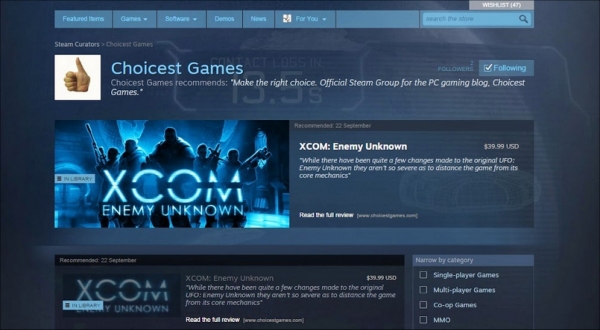Steam Service Agreement Requires Users To Divulge Paid Endorsements

If you're a Steam Curator or a Steam Broadcaster and you use the Steam services to help promote games, stream games or recommend games, well, you'll be required to disclose any financial ties or paid endorsements per the new FTC guidelines regarding online streaming content and online videoG affiliate and paid advertising promotions.
Gamasutra noticed a change in the way the subscriber agreement on Steam was worded compared to a previous entry in the end-user license agreement. What changed? Disclosure.
Valve is the latest to get in on the action, adding the following clause to section 6 titled “User Generated Content”, under sub-section C., which reads...
“If you use Steam services (e.g. the Steam Curators’ Lists or the Steam Broadcasting service) to promote or endorse a product, service or event in return for any kind of consideration from a third party (including non-monetary rewards such as free games), you must clearly indicate the source of such consideration to your audience.”
This effectively absolves Valve of any consumer revolts against Steam curators who may be getting paid to endorse or promote various content under their curation channel but have not publicly disclosed it, something that put YouTube, Microsoft, Electronic Arts and Machinima all under the Federal Trade Commissions' microscope during the XB1M13 campaign from back in early 2014.
The big issue back then was the lack of disclosure from YouTubers who participated in the campaign. However, the way the contracts were worded it indicated that they were not encouraged to disclose their financial ties to the promotional campaign. This put a lot of YouTubers in a bad place as they were given an opportunity to make bank just by playing games (and avoiding negative impressions of the products) without notifying their audience that their video was a paid endorsement.
The amendment Valve added to the Steam subscriber agreement is just annexation to what was already added as a note on the Steam Curator's list, as noted by Gamasutra from when the clause was originally added back in October of 2014.
The FTC, at the behest of ethics-hungry consumers, have been working hard to ensure that consumers are protected and well informed about product placements, paid affiliations, endorsements, as well as compensation in the form of free products.
CINEMABLEND NEWSLETTER
Your Daily Blend of Entertainment News
The FTC also has been working to improve their guidelines following a consumer campaign about major media websites utilizing native ads – the trade commission wanted to further clarify the rules around native advertising and disclosure to better help inform readers about the advertising practice, especially given that previous reports indicated that barely half of all readers of digital media content can tell a normal news piece from a paid native ad post.
In the case of Valve, they've just ensured that they won't be caught in any crosshairs if a content curator, journalist or media personality gets nailed in an disclosure violation and they need to create separation from the incident. You can learn more by checking out the full Steam subscriber agreement right here.
Many gaming sites have likewise shared disclosure agreements over the past few months as well. Sites that have published these agreements include The Escapist, Destructoid, Polygon, Kotaku, IGN and The Verge. The exact terms differ from site to site but essentially each site pledged to disclose any free swag, conflicts of interest or promotional content.
Staff Writer at CinemaBlend.
The Last Of Us Season 2 Episode 3 Live Blog: I'm Talking The Aftermath Of Joel's Tragedy, Ellie's Recovery And More
I Think Tom Hardy's New Action Movie Havoc Is A Total Blast, But One Detail Is Keeping Me From Outright Loving It
Full House's Jodie Sweetin And Andrea Barber Address 'Weird Question' They're Often Asked About Co-Star John Stamos, And It Sounds Like Fans Think the Tanners Are The Brady Bunch










